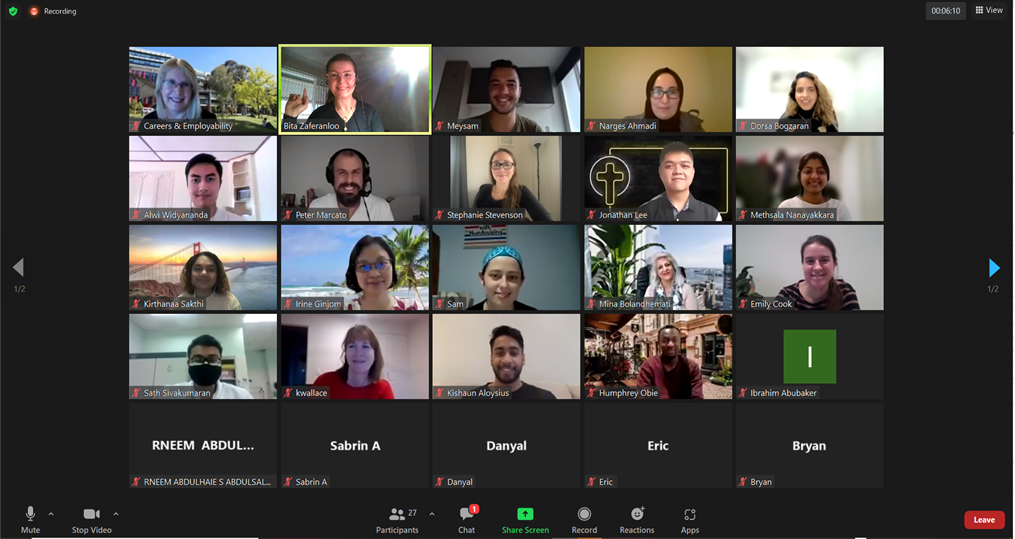STEMM students propose sustainability solutions

Kirthanaa Sakthi and Alwi Widyananda won the 2021 STEMM Infographic competition at a virtual event
In summary
- The 2021 STEMM Infographic competition encouraged students to create an infographic presentation that enhances community knowledge with their ideas to solve sustainability issues
- Kirthanaa Sakthi and Alwi Widyananda’s won with presentation ‘This bacteria wants to eat your plastic waste’
- Miss Sakthi and Miss Widyananda pitched the addition of plastic (PET) eating bacteria in a microplastic removal chamber to improve the wastewater treatment system
Swinburne Sarawak students Kirthanaa Sakthi and Alwi Widyananda have won the 2021 student STEMM Infographic competition with their presentation ‘This bacteria wants to eat your plastic waste’.
Using their science communication skills, students from around the world collected data and created a digestible infographic video presentation with the Adobe Creative Cloud to boost community knowledge on how to solve sustainability problems.
Forming a part of Swinburne’s Shaping STEMM Futures Initiative, the competition aims to enhance communication and digital literacy skills and build employability. It also provides students with training on how to use the Adobe Creative Cloud.
Convenor of Swinburne’s Communication for Scientists unit and event organiser, Dr Bita Zaferanloo, says the winning presentation addresses ‘one of the most pressing environmental issues’.
‘Their animated video visualising scientific data was able to inspire and inform the community to know more about problem and potential STEMM solution and its sustainable impact. Kirthanaa Sakthi and Alwi Widyananda made an inspiring, creative and inclusive video.’

Kirthanaa Sakthi and Alwi Widyananda won the 2021 STEMM Infographic competition with their presentation ‘This bacteria wants to eat your plastic waste’
Miss Sakthi and Mr Widyananda are currently in their second year of the Bachelor of Science majoring in Biotechnology.
Hoping to reduce plastics that are toxic to marine life in waterways, Miss Sakthi and Miss Widyananda pitched the innovative idea to add plastic (PET) eating bacteria in a microplastic removal chamber to improve the wastewater treatment system.
If implemented, it would reduce the amount of microplastics from reaching waterways, resulting in cleaner water and boosting the ability to make new PET plastic for industrial recycling.
‘Teamwork, collaboration and planning are ingrained in us from studying at Swinburne. These vital skills enabled us to come up with our STEMM idea for the infographic,’ Mr Widyananda says.
Miss Sakthi and Mr Widyananda feel ‘extremely grateful to win’, particularly after working through time pressures and a six hour time difference, with them living in Malaysia and Zimbabwe respectively.
The STEMM Infographic competition provided us the opportunity to express our knowledge in a fun and new format for others to learn.’
-
Media Enquiries
Related articles
-

- Technology
- Business
Seven Swinburne startups to watch in 2024
Swinburne University of Technology’s Innovation Studio has unveiled its latest group of early-stage startups.
Friday 06 September 2024 -

- Science
- Sustainability
Green steel revolution: How Swinburne researchers are shifting steel manufacturing towards net zero emissions
Swinburne is developing new methods to minimise the environmental footprint of one of the world’s most widely used metals.
Friday 20 September 2024 -

- Design
- Technology
Swinburne supports Acusensus to develop innovative road worker safety device
Swinburne University of Technology's Centre for Design Innovation is supporting Acusensus to enhance the safety of roadside workers and first responders through research and design of advanced technology.Friday 02 August 2024 -

- Astronomy
- Science
Swinburne-led fungi experiment blasts off to the International Space Station
An experiment developed by Swinburne has been launched into space, containing three types of fungi: Lion’s Mane, Turkey’s Tail, and Cordyceps.Monday 05 August 2024 -

- Technology
Multi-million dollar MedTech and supercomputer facilities at Swinburne on show
Swinburne University of Technology has welcomed the Minister for Skills and TAFE Gayle Tierney and Member for Southern Metropolitan Region John Berger MP on a tour of our leading tech facilities.
Thursday 08 August 2024

